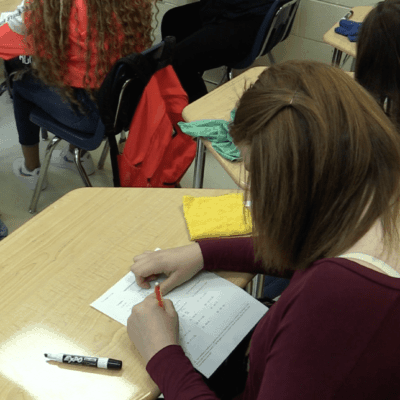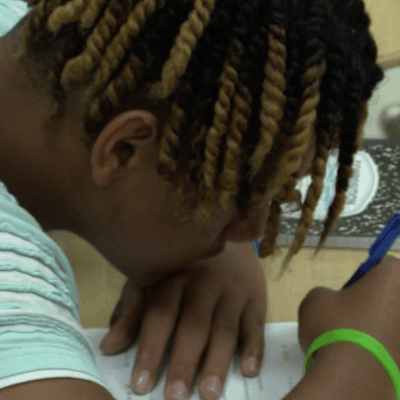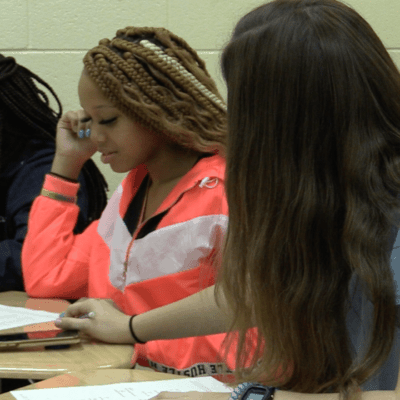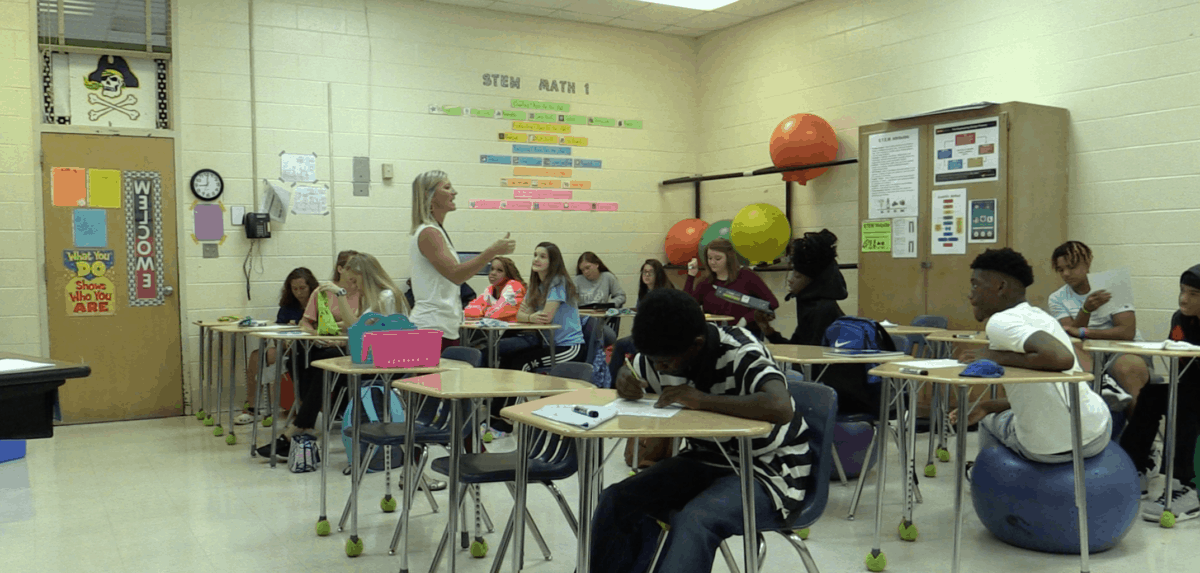

When Carrie Miller was growing up, she moved around a lot. She went to 14 schools between kindergarten and 12th grade. That set the stage both for her becoming a teacher and also learning to be a great one.
“The teachers made a huge impact on me just being comfortable, and I just zoned in on that,” she said.
Her desire to become a teacher goes all the way back to second grade, when her teacher had the class fill out a form saying what they wanted to be when they grew up. Miller wrote “teacher,” but it wasn’t just some far-off fantasy. She was already practicing.
She had two brothers and a sister. Miller would get old math worksheets from her teachers, and she would bring them home where she had a chalkboard set up. Then she brought her siblings in.
“I would make them sit down and be my students,” she said, adding: “They got something out of it.”
In the late ’90s she left high school and went on to East Carolina University fully intending to become an education major, but her plans were quickly waylaid.
Early in her first semester, Miller and other new students were put in a room and shown a chart with a bunch of careers and all the possible degrees they could pursue at the university. Teachers were at the very bottom.
“I immediately changed my mindset from that day,” she said. “Which was a mistake, but also a blessing.”
Instead, Miller went into criminal justice. During college, she worked for a few years at a law firm, and she continued there for a couple of years after graduation. She would meet a lot of clients — teenagers who were in trouble with the law. That’s when she decided she needed to go back to her original passion.
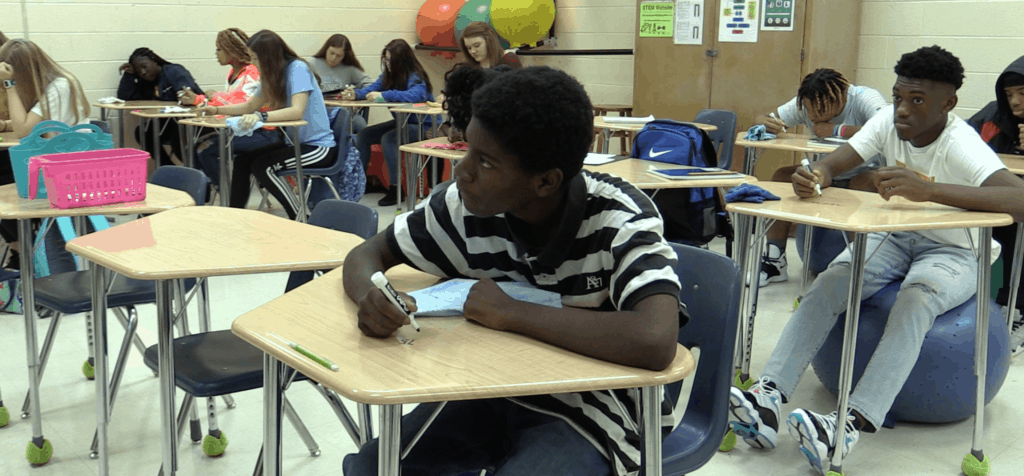

“I felt like I was reaching them too late,” she said. “They were already in trouble, already involved with the law, and I felt like I could make more of a difference if I could reach them in the school setting.”
Miller called around to different schools, and Greene Central High School in Snow Hill, where she still works today, had an opening for an exceptional children (EC) teacher. Through lateral entry, she got the job, and she also went back to get her master’s degree in EC. For the first 12 years of her teaching career, she focused on these students at Greene Central High before she decided to make a change. Miller went back to school and got certified in mathematics, and that’s what she’s been teaching ever since.
Carrie Miller’s advice for teachers:
Be flexible
“Your way is not always the right way. You need to be flexible in how you deliver, how you instruct, based on the students in your group.”
Keep learning
“Continuing to grow in your teaching is very important. What I did my first couple of years teaching, I wouldn’t dare do now.”
Don’t take things personally
“Students get angry. Students get frustrated. You start each day new. Whatever was done the day before, especially if it was negative, just don’t take things personally.”
What makes a great teacher?
Patrick Miller, superintendent of Greene County Schools and 2019 North Carolina Superintendent of the Year, recommended Carrie Miller as one of the best teachers in the district. He said she is student-oriented, something he thinks is crucial to becoming a great teacher.
“She works really hard to build positive relationships with her students,” he said.
She was also one of the first teachers in the district to attempt blended learning in the classroom, and she was so effective that she was featured for her work.
“She has … worked diligently to effectively utilize the technological resources we have made available for the classroom,” Superintendent Miller said. “Because of this, she is not afraid to attempt new teaching strategies in her efforts to help her students master the content in Math I.”
Blended learning combines online learning — which is driven by students — with more traditional instruction by a teacher in the classroom.
Carrie Miller agrees with her superintendent that one of the things that makes her a great teacher is her ability to cultivate relationships.
“You can teach someone to do the math. You can show them the steps to do it, and they can do it,” she said. “But if you don’t show them that you care — and that it’s a genuine care — the drive, I think, is missing.”
And it’s important to establish relationships not only with students, but with teachers as well. She said that collaborating is one of the best ways to improve your skill set. Bouncing ideas off other professionals helps a teacher get out of his or her own head and see new ways of doing things, Miller said.
That collaborative approach is something she’s seen change over her 22 years in the classroom. When she became a teacher, educators typically had very regimented classrooms that were islands unto themselves.
“Before it was my classroom, my handout, my work,” she said. “They didn’t want to share. The doors were closed. It was all individual.”
That’s changed over time, and she said teachers today are much more open to new experiences, and they come in primed to work collaboratively.
Educating the educators
Miller’s training as a teacher was largely the result of educator preparation programs, as with most teachers. She said that while a teacher preparation education gave her the fundamentals she needed to teach, she missed out on some practical skills during her training.
“The first day when you walk in, all of that kind of goes out the window,” she said. “I think what they don’t prepare you for is how to manage a classroom.”
One of the biggest additions Miller thinks educator prep programs can bring is to expose student teachers to a wide array of teaching experiences. They need to see different personalities, different teachers, and different students to get a feel for all the scenarios they might face.
“I just think the more hands-on, the more experience that you have, it’s just better,” she said. “The interns that we’ve had, I haven’t seen that.”
Miller got a lot of that herself just from her upbringing. Her parents divorced and both remarried, so she spent her childhood in Indiana bouncing between schools. That forced her to be flexible.
“I think when you moved around so much and you’re exposed to so many different environments and personalities and teachers and students … you learn to adapt based on your surroundings,” she said.
She mentioned a teaching student who observes one of her classes. The student came from a good home, was an honors student, and was never really exposed to a population of youth who don’t have the advantages, backgrounds, and preparation that she does.
“It’s a culture shock for her,” Miller said.
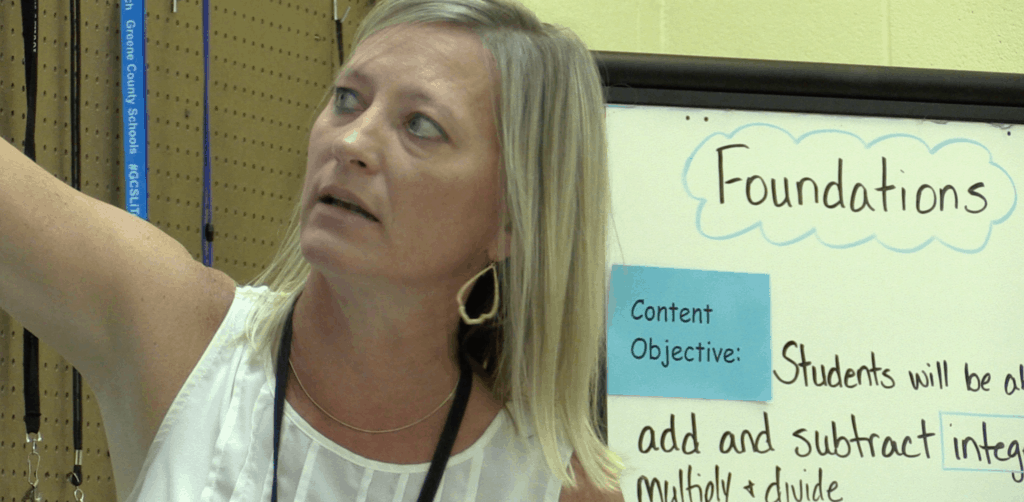

The support Miller gets from her district, coupled with her desire to be nowhere but in the classroom, gives her a unique perspective that she’s not sure every teacher gets.
“I absolutely love my job. I love coming in here. I love just the support that I have,” she said. “And everything else just kind of falls into place. And I don’t think that’s normal.”


